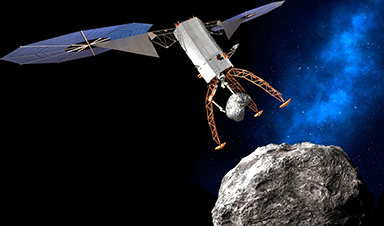In 2015 Congress passed a law to legalise mining in outer space—the first of its kind in the world.
Firms that some day manage to mine asteroids for resources like water or precious metals would henceforth be allowed to own, process, and sell anything harvested. The nascent space-mining industry was thrilled. The boss of a firm called Planetary Resources compared it to the Homestead Act of 1862—a law that gave up to 160 acres in the American West to any plucky settler willing to venture forth.
More recently Wilbur Ross, the commerce secretary, has talked about creating a more “permissive” regulatory environment in space and turning the moon into a “gas station” for further exploration. Other countries are following suit: Luxembourg passed a similar measure last year and earmarked €200m to invest in space-mining companies.
But not everyone is pleased. At the UN committee dealing with outer space, Russia condemned the American move, citing America’s “total disrespect” for international law. Critics say America is conferring rights that it has no authority to confer. There are indeed legal grey areas.
Who owns what in outer space?
Image Credit: © SPL
News This Week
Team finds flawed data in recent study relevant to coronavirus antiviral development
The COVID pandemic illustrated how urgently we need antiviral medications capable of treating coronavirus infections. To aid this effort, researchers quickly homed in on part of SARS-CoV-2's molecular structure known as the NiRAN domain—an [...]
Drug-Coated Neural Implants Reduce Immune Rejection
Summary: A new study shows that coating neural prosthetic implants with the anti-inflammatory drug dexamethasone helps reduce the body’s immune response and scar tissue formation. This strategy enhances the long-term performance and stability of electrodes [...]
Scientists discover cancer-fighting bacteria that ‘soak up’ forever chemicals in the body
A family of healthy bacteria may help 'soak up' toxic forever chemicals in the body, warding off their cancerous effects. Forever chemicals, also known as PFAS (per- and polyfluoroalkyl substances), are toxic chemicals that [...]
Johns Hopkins Researchers Uncover a New Way To Kill Cancer Cells
A new study reveals that blocking ribosomal RNA production rewires cancer cell behavior and could help treat genetically unstable tumors. Researchers at the Johns Hopkins Kimmel Cancer Center and the Department of Radiation Oncology and Molecular [...]
AI matches doctors in mapping lung tumors for radiation therapy
In radiation therapy, precision can save lives. Oncologists must carefully map the size and location of a tumor before delivering high-dose radiation to destroy cancer cells while sparing healthy tissue. But this process, called [...]
Scientists Finally “See” Key Protein That Controls Inflammation
Researchers used advanced microscopy to uncover important protein structures. For the first time, two important protein structures in the human body are being visualized, thanks in part to cutting-edge technology at the University of [...]
AI tool detects 9 types of dementia from a single brain scan
Mayo Clinic researchers have developed a new artificial intelligence (AI) tool that helps clinicians identify brain activity patterns linked to nine types of dementia, including Alzheimer's disease, using a single, widely available scan—a transformative [...]
Is plastic packaging putting more than just food on your plate?
New research reveals that common food packaging and utensils can shed microscopic plastics into our food, prompting urgent calls for stricter testing and updated regulations to protect public health. Beyond microplastics: The analysis intentionally [...]














Leave A Comment